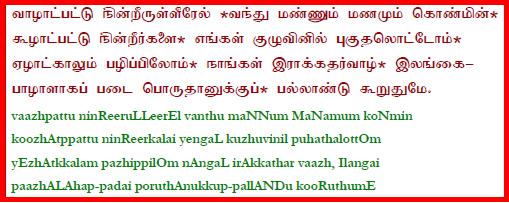
Meaning:
SANSKRIT COMMENTARY OF UPANISHAD BHASHYAKARAR COMMENTARY FOR THE FIRST LINE OF THE THIRD PAASURAM:
“VaazhAtppattu ninReeruLLeerEl vanthu maNNum maNamum koNNmin”
BhagAva’ns disposition (reethi) is that He alone should not be enjoying the bliss (Sa yEkAki na ramathE, yEka svAdhu na bhunjeetha). The Lord delights in His BhagavathAs sharing that bliss with Him. Following that reethi of the Lord, PeriyAzhwAr is not content with his own MangaLAsAsanam alone of the Lord; hence, he invites Jn~Anis, KaivalyArTees (those who enjoy and stop at aathma saakshAthkAram or AathmAvalOkanam) and IsvaryArTees (those who just seek material wealth) to join him in the MangaLAsAsanam for the Lord through the next three Paasurams.
In the First of this set of three paasurams, AzhwAr starts with the invitation to the Jn~Anis to join him in the MangaLASAsanam. The Jn~Anis have the one and only goal of gaining freedom from the sorrows of SamsAram. They know that the indhriyams are given to us for engagement in Bhagavath Kaimkaryam (KaraNa kalEbhara parigruhasya Bhagavath paricharaNaika arTam ithi jn~Athavantha:). They enhance their Svaroopa satthai this way and engage in single-minded kaimkaryam to their Lord. With this nishtai (determination and dedicated efforts), they come to be known as Jn~Anis, who are dear to the Lord. AzhwAr invites the Jn~Anis to share the MangaLAsAsana rasam.
PeriyAzhwAr asks such Jn~Anis to carry the Mud (MaNN) and the fragrance (MaNam/sandal paste)used in the ankurArpaNam portion of the Uthsavam for the Lord.
MeemAmsakAs explain the meaning of the use of the two words: MaNN and MaNam. MaNN according to them is that good fortune (adhrushtam) acquired through the cognition of the objects by sight. This is called “SannipathyOpakArakam.” MaNN (the specimens of earth used in ankurArPaNam) is an object of cognition by the eye. Since we use that which is seen by the eye for Bhagavath kaimkaryam, it is called SannipathyOpakArakam.
MaNam is not identified by the eye. It is only cognized by the senses such as smell and related to thereafter. Kaimkaryam done with such objects (fragrance of sandal paste) and the adhrushtam arising through their use is known as AaradhupakArakam.
AzhwAr invites the Jn~Anis as competent adhikAris to join him in using MaNN and MaNam as examples of SannipathyOpakaaraka and AaradhupakAraka vasthus for Bhagavath MangaLAsAsana Kaimkaryams.
SECOND LINE OF THE THIRD PAASURAM
“KoozhAtpattu ninReerkaLai yengaL kuzhuvinil puhathalottOm”
“chamUshasya-kruthE dhAsatayA sTithAn YushmAn asmadheeyE samaajE
(ParamaikAnthinAm SamAjE) na pravEsyAmA:, BhavathAm pravEsam
naanumanyEmahi “.
AzhwAr draws a line on who can join his ghOshti. As the group belonging to ParamaikAnthis (who will not even look at anyadEvathAs and seek any thing for their vishaya samruddhi from the ParamAthmA), Jn~Anis are invited to join the AzhwAr. Others, who seek material blessings and serve others (Kings, other gods) are called PrayOjanAnthara-pararkal. They seek goals other than Moksham and ParamaikAnthithvam. AzhwAr excludes the joining of such prayOjanAnthaparars from his ghOshti. Sri R.S. Desikan and B.L.RanganAthan have translated this section in English this way:
“Ye slaves of men, you are not of us. Only ye that hunger for the freedom of your souls, come unto us and join our choir eternal. We have been for generations a stainless, glorious band of men ever devoted to the service of the Lord”
AzhwAr says that with all these disparities and differences between us, it is not possible for us to come together as a ghOshti. Therefore, we wont let you into our ghOshti of ParamaikAnthis and ananya prayOjanaparALs. You may be a Bhagavath BhakthA but you are engaged in other prayOjanams. Hence we wont let you into our group.
THIRD AND FOURTH LINES OF THE PAASURAM
yEzhAtkkaalum pazhippilOm naangaL Iraakkathar vaazh Ilangai
paazhALahap-padai poruthAnukku PallANDu kooRuthumE
Devoid of any blemishes (seeking other gods or yearning for other fruits) all through seven generations, we sing PallANDu to Lord Raamachandran, who with His army fought the raakshasAs of LankApuri and destroyed them all with His parAkramam.
Source:










Can you send me the link for Pallaanda Pallaanda sholka of Perumal as I would like to learn and recite it everyday. Please send the link to my email id given above